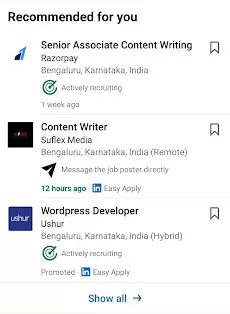Imagine a marketing strategy that speaks directly to your customers, understands their unique needs and preferences, and delivers tailored messages that resonate with them on a personal level. Sounds like a dream, right? Well, with the power of AI in personalized marketing, this dream becomes a reality.
In this blog, we will uncover the secrets behind AI-driven personalized marketing, exploring its incredible benefits, the challenges it presents, and the exciting future trends that will shape the marketing landscape.
Let’s delve into the captivating world of AI in personalized marketing and discover how it’s changing the game for businesses worldwide.
Understanding Personalized Marketing
Personalized marketing is when businesses send messages and offers to customers that are tailored to their individual needs and interests. This is different from generic mass marketing, where the same message is sent to everyone.
Personalized marketing is becoming increasingly important as consumers become more demanding and have more choices. Businesses that can personalize their marketing messages will be more likely to stand out from the competition and attract new customers.
Here are some personalized marketing examples:
- Amazon recommends products to customers based on their purchase history and browsing behavior.
- Netflix recommends movies and TV shows to customers based on their viewing history and ratings.
- Facebook shows users content that is likely to be of interest to them based on their interests and friends.
These are just a few examples of how personalized marketing can be used. As technology continues to develop, we can expect to see even more sophisticated forms of personalized marketing in the future.
What’s Trending on EasyDigiGrow: The role of Micro-Influencers in social media marketing
Artificial Intelligence in Marketing
Artificial intelligence (AI) is a part of computer science that focuses on making machines smart so they can do things that usually need human intelligence.
Lately, AI has become really important in digital marketing services and has changed how businesses understand and connect with their customers.
AI offers a range of applications in marketing, transforming processes and enabling more effective decision-making.
Some of the key areas where AI is making a significant impact include customer segmentation and targeting, predictive analytics, content personalization, chatbots and virtual assistants, and sentiment analysis.
The Role of AI in Personalized Marketing
AI-powered customer data analysis and insights
- Data collection and processing: AI enables businesses to collect and process vast amounts of customer data from various sources, including websites, social media platforms, and customer relationship management (CRM) systems.
This information can include details about people’s age, gender, shopping history, what they look at online, and how they interact with things.
- Customer profiling and segmentation: AI algorithms can analyze customer data to create detailed customer profiles and segments.
By understanding customer preferences and behaviors, marketers can develop targeted digital marketing strategies that resonate with specific customer groups.
- Real-time data analysis and decision-making: AI facilitates real-time data analysis, allowing marketers to make data-driven decisions on the fly.
By monitoring customer interactions, AI can provide insights into customer behavior and preferences, enabling marketers to adjust their campaigns in real-time for optimal results.
Hyper-personalization through AI algorithms
- Behavioral tracking and predictive modeling: AI algorithms can track customer behavior across multiple touchpoints, allowing marketers to understand individual preferences and predict future actions.
This enables the delivery of hyper-personalized experiences, such as tailored product recommendations or customized content.
- Dynamic content creation and delivery: AI can automate the creation and delivery of personalized content.
By analyzing customer data and preferences, AI algorithms can generate dynamic content that adapts to individual customers, increasing engagement and conversions.
- Individualized product recommendations: AI-powered recommendation engines can analyze customer data and generate personalized product recommendations based on individual preferences and behavior.
This helps customers discover relevant products and enhances cross-selling and upselling opportunities for businesses.
Enhanced customer experience through AI-driven marketing
- Chatbots and virtual assistants for personalized interactions: AI-powered chatbots and virtual assistants provide personalized and instant support to customers, offering tailored recommendations and solutions based on their specific needs.
This improves customer satisfaction, reduces response times, and enhances overall customer experience.
- Voice and image recognition for seamless experiences: AI technologies such as voice recognition and image analysis enable seamless interactions between customers and brands.
Voice-activated devices and visual search capabilities allow customers to engage with businesses effortlessly, further enhancing personalized experiences.
- AI-powered customer service and support: AI-powered customer service tools can analyze customer queries and provide instant solutions or escalate complex issues to human representatives.
This not only improves response times but also ensures consistency and accuracy in customer support.
Also, check out our top content marketing strategies to captivate your audience and create engaging content
The Benefits of AI in Personalized Marketing
- Increased engagement: Personalized marketing can help to increase customer engagement by providing them with content and offers that are relevant to their interests. This can lead to higher click-through rates, conversion rates, and customer lifetime value.
- Improved customer satisfaction: It can help to improve customer satisfaction by providing them with a more tailored and personalized experience. This can make customers come back again and tell others good things about the business.
- Increased sales: Personalized marketing can help to increase sales by showing customers products and services that they are more likely to be interested in. This can lead to more impulse purchases and higher average order values.
- Reduced marketing costs: It can help to reduce marketing costs by ensuring that marketing messages are targeted to the right people. This can make marketing campaigns give a higher return on investment (ROI).
Check out our top read: Future of augmented reality in digital marketing
How to Use AI in Personalized Marketing?
There are a few key steps that businesses need to take in order to use AI for personalized marketing. These steps include:
- Collect data: Collect data about your customers like demographics, purchase history, browsing behavior, and social media activity.
- Clean and analyze data: Clean and analyze the data, this will help you to identify patterns and trends in customer behavior.
- Build a model: Build a model that will predict customer behavior. This model can be used to personalize marketing messages.
- Deploy the model: Once you have built a model, you need to deploy it. This means making it available to your digital marketing team so that they can use it to personalize marketing messages.
Case Studies of Successful AI Personalized Marketing Campaigns
- Spotify’s personalized playlists:
Spotify uses AI algorithms to analyze user preferences, listening habits, and music choices to create personalized playlists such as Discover Weekly and Daily Mix.
These curated playlists provide users with a unique and tailored music experience, increasing user engagement and satisfaction.

- Starbucks’ personalized offers:
Starbucks uses AI-powered analytics to deliver personalized offers and recommendations to its customers through its mobile app.
By analyzing customer data and purchase history, Starbucks can offer targeted promotions and rewards, driving customer loyalty and repeat visits.
- Netflix’s content recommendations:
Netflix leverages AI algorithms to analyze user viewing patterns, ratings, and interactions to provide personalized content recommendations.
By delivering highly relevant suggestions, Netflix enhances the user experience, increases engagement, and reduces churn rates.
- LinkedIn:
LinkedIn uses AI to personalize its job recommendations. The AI algorithm takes into account a user’s skills, experience, and interests to recommend jobs that are likely to be a good fit.
This has helped LinkedIn to increase job placement rates and customer satisfaction.

Challenges of AI in Personalized Marketing
There are a few challenges that businesses need to be aware of when using AI for personalized marketing. These challenges include:
- Data privacy: Businesses have to be careful when they get and use customer information. They have to make sure they collect data in a clear and fair way.
- Bias: AI models can be biased if they are trained on data that is biased. Businesses need to be careful to avoid bias in their data and in their models.
- Cost: AI-powered personalized marketing can be expensive. Businesses need to make sure that they are getting a good return on their investment before they invest in AI.
Finding the Right Balance Between Automation and Human Interaction.
While AI can automate many aspects of personalized marketing, human oversight is essential to ensure that the AI systems align with business goals, ethics, and customer preferences.
It is important for businesses to strike a balance between automation and maintaining genuine human connections. Customers value authentic interactions, and businesses should ensure that personalized marketing efforts do not feel impersonal or intrusive.
Understand the impact of digital marketing on your business with our comprehensive guide
Future Trends in AI-driven Personalized Marketing
- Advanced machine learning algorithms and AI models:
As AI technology advances, more sophisticated machine learning algorithms and AI models will emerge, enabling businesses to gain deeper insights into customer behavior and preferences.
- Integration of AI with emerging technologies (e.g., Internet of Things):
The integration of AI with emerging technologies like the Internet of Things (IoT) will enable marketers to gather real-time data from connected devices, allowing for even more personalized and context-aware marketing experiences.
- Personalization at scale with AI-powered automation:
AI-powered automation will allow businesses to deliver personalized marketing experiences at scale, enabling them to engage with a larger customer base effectively.
- Ethical and responsible AI in marketing:
There will be an increased focus on ethical and responsible AI usage in marketing. Businesses will prioritize fairness, transparency, and customer consent in their AI-driven personalized marketing efforts.
Final Thoughts
The integration of AI in personalized marketing is transforming the way businesses connect with their customers. Through AI-driven customer profiling, real-time data analysis, and hyper-personalization, businesses can deliver tailored messages, recommendations, and experiences that captivate their audience.
EasyDigiGrow is at the forefront of leveraging AI in personalized marketing. As a leading digital marketing company in Noida in this field, EasyDigiGrow understands the importance of delivering exceptional customer experiences.
Through our cutting-edge AI technologies and expertise, we assist businesses in harnessing the power of personalization to drive growth and success.
It’s time to unlock the full potential of AI in personalized marketing and embark on a journey of transformative growth.
FREQUENTLY ASKED QUESTIONS
- What is personalized marketing, and how does it differ from traditional marketing?
Personalized marketing is the practice of tailoring marketing strategies and messages to meet the individual needs and preferences of customers. It differs from traditional marketing, which often relies on mass messaging and generic campaigns that may not resonate with individual customers.
- Can AI truly understand and predict customer behavior accurately?
AI algorithms can analyze large datasets and identify patterns and correlations that humans may not be able to detect. While AI can provide valuable insights and predictions, it is important to consider that customer behavior can be influenced by various factors and may not always be accurately predicted.
- How does AI ensure data privacy and security in personalized marketing?
AI-driven personalized marketing relies on the collection and analysis of customer data. To ensure data privacy and security, businesses must implement robust data protection measures, obtain appropriate consent from customers, and comply with relevant data protection regulations.
- Will AI replace human marketers in the future?
AI is not expected to replace human marketers entirely. While AI can automate certain tasks and processes, human marketers provide the creative thinking, strategy development, and emotional intelligence that are crucial for building meaningful connections with customers.
- How can businesses get started with AI in personalized marketing?
To get started with AI-powered personalized marketing, businesses should assess their data infrastructure, invest in AI technologies and tools, define clear objectives and metrics, and gradually implement AI-driven strategies while continuously monitoring and refining their approaches.
 seolounge
seolounge
